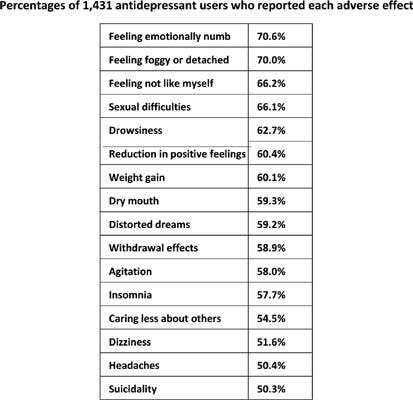Dangers of Antidepressant Use During and AFTER Pregnancy
Are Women of Child-bearing Age Informed of the Risks?
A new study in Psychological Medicine reports babies born to mothers taking antidepressants were more than six times as likely to have neonatal withdrawal syndrome—including:
breathing problems
irritability/agitation, tremors
feeding problems
Seizures—than those born to mothers taking other types of drugs.
More than 80% of the reported symptoms were classified as serious.
In a recent episode of the Radically Genuine Podcast, we had the privilege of hosting Dr. Adam Urato, a distinguished Maternal and Fetal Medicine Physician. Our conversation delved into the crucial topic of the effects of SSRI medications on the developing fetus. If you're interested in gaining comprehensive insights, we invite you to tune in and listen to the entire episode by Clicking here
As you might envision, social media platforms such as YouTube often limit the dissemination of crucial information and stifle the voices of professionals striving to share insights that could potentially challenge the pharmaceutical industry. This industry relies heavily on advertising revenue, making it imperative for these platforms to carefully tread the line between information dissemination and financial interests. Below is a clip of our interview.
Dr. Urato emphasized the pivotal role of serotonin in fetal development, emphasizing that these drug cross the placental barrier, directly affecting the developing baby. They have been implicated in potential birth defects and can also lead to neonatal withdrawal symptoms. Increased rates of preterm birth are well established.
At some point, we must comprehend what has lead to the astronimical surge in autism cases. Dr. Urato revealed an association between prenatal exposure to SSRIs and conditions such as autism, motor abnormalities, and an array of developmental delays. He has brought to light the findings of nine fMRI studies that reveal discernible disparities in the maturing brain when contrasting infants exposed to SSRIs during pregnancy with their non-exposed counterparts.
Are pregnant women and women of child-bearing age adequately apprised of these potential risks? In my observation, it appears they often are not. In fact, a cursory Google search readily unveils websites that downplay any conceivable risks, and this appears to be a deliberate and calculated approach on the part of the pharmaceutical industry.
What about Postpartum?
Numerous sources of evidence have consistently demonstrated that selective serotonin reuptake inhibitors (SSRIs) commonly contribute to or exacerbate a wide range of abnormal mental and behavioral conditions. Antidepressants may double the risk of suicide and SSRI’s were the most strongly and consistently implicated drug associated with violence in a review of prescription drugs. Inexplicably, despite research indicating an increased risk of suicidal thoughts and events compared to placebo, these drugs continue to be commonly recommended as first-line treatments for individuals experiencing suicidal ideation. Additionally, it appears that a percentage of people exhibit alterations in how they metabolize these drugs, increasing several overlapping clinical phenomena associated with violence against self or others that include:
Stimulant profile: SSRIs can induce a spectrum of stimulant-like effects, varying from mild agitation to manic psychoses. These manifestations can significantly impact an individual's mental state and lead to a range of abnormal behaviors.
Agitated depression: Some individuals may experience an increase in agitation and restlessness when taking SSRIs, which can intensify depressive symptoms and contribute to a worsening mental condition.
Obsessive preoccupations: SSRIs have been associated with the development of obsessive thoughts or preoccupations that are uncharacteristic or unfamiliar to the individual. These intrusive and distressing thoughts can significantly impact mental well-being.
Akathisia: Akathisia refers to a state of inner restlessness and an inability to remain still. It can manifest as an adverse reaction to SSRIs, leading to extreme discomfort and an escalation of abnormal behavior, including violent acts against self or others.
When evaluating the well-being of both mother and child, it is essential to recognize that the factors contributing to postpartum depression are multifaceted, encompassing aspects such as sleep deprivation, stress, bodily changes, hormonal fluctuations, and the adjustment to a new family dynamic, among others. Notably, there is no substantiating research indicating that SSRIs offer protection against postpartum depression, nor is there evidence suggesting a serotonin abnormality corrected by SSRIs in this context. Given this, one might question the rationale for taking the associated risks.
An online survey gathered responses from 1,431 adult antidepressant users across 38 countries. The results were striking: 61% of participants reported experiencing at least ten out of the 20 specified adverse effects. The most common effects included emotional numbness (71%), feeling foggy or detached (70%), not feeling like oneself (66%), sexual difficulties (66%), drowsiness (63%), and a reduction in positive feelings (60%). Shockingly, 50% reported experiencing suicidality as a result of the medication.
I like to think of myself as a reasonable individual, but I'm genuinely puzzled by how a medication that induces emotional numbness can be deemed protective against postpartum depression while not adversely affecting the emotional bond between the mother and her baby.
Lastly, when a mother takes SSRI medication, she is now passing the drug to her baby. Are we expected to believe that this has no impact? I sought guidance from the United States Center for Disease Control (CDC) to understand their stance on the safety of SSRIs for breastfeeding babies, and their response was rather equivocal: "Maybe."
Just to clarify, are we to understand that while SSRIs, when exposed to the baby in utero, have been associated with birth defects, pre-term birth, neonatal withdrawal, autism, and developmental delays, they are now considered potentially safe when administered to an infant?
Now who is willing to take this risk?
P.S. A heartfelt thank you to all my subscribers! While I offer all my articles for free, your support through donations would be greatly appreciated. Your generosity helps me continue delivering valuable content. Thank you for being a part of this incredible community! If you are interested in more thought provoking conversations please subscribe and download the Radically Genuine Podcast with Dr. Roger McFillin.




